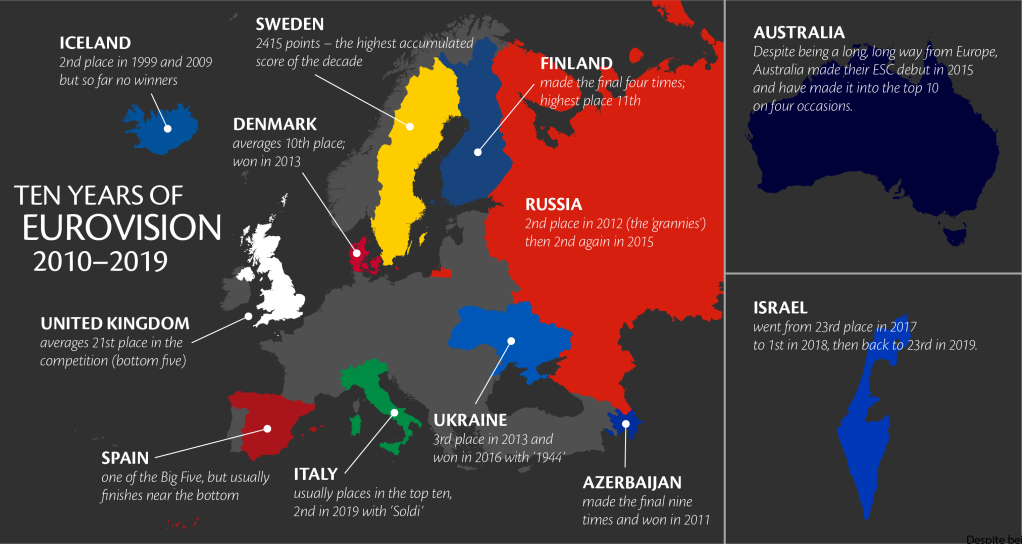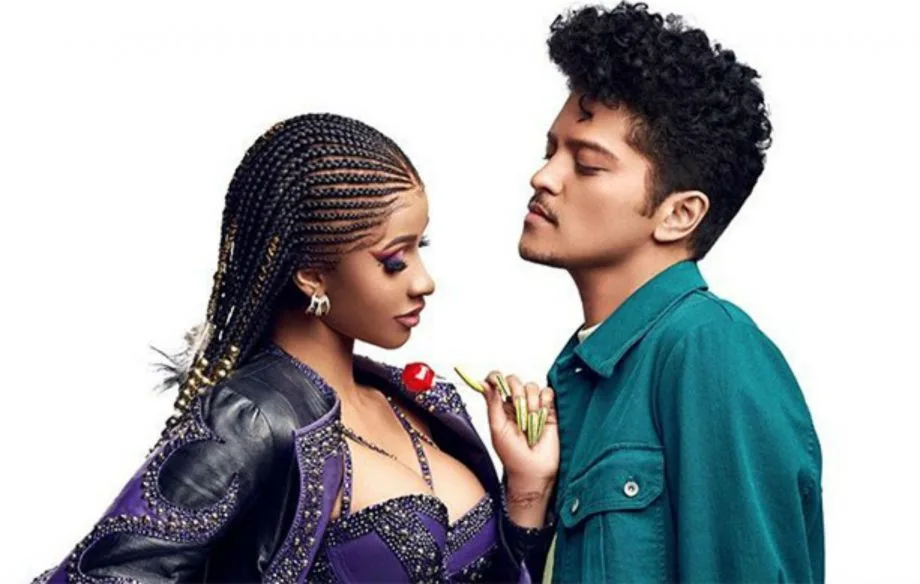Mindblown: a blog about philosophy.
-

Eurovision Song Contest research
Regular readers will know that I have been live-blogging the Eurovision Song Contest final since 2011. Every year I sit down in front of the TV, metronome and guitar in hand, and write live musical analysis of the songs in real time, then attempt to predict the winner before the voting starts. Here’s the full…
-
Irving Berlin: Nine Rules for Writing Popular Songs
Article and interview by Frank Ward O’Malley (1875-1932) Originally published in ‘The American Magazine’, Volume 90, October 1920 Transcribed by Joe Bennett from the Google Books version, January 2020 JB comment: This semester, I’m very pleased to be teaching one of Berklee’s ‘survey’ classes – History of Rock. As part of the ‘prehistory’ session we…
-
A Night At The Opera: The Music of Queen #berklee
On December 5th 2019, Berklee staged its annual Singers’ Showcase, and the theme this year was A Night at the Opera—The Music of Queen. As a lifelong fan, I was honored to be asked to write the program notes for the evening’s performance. Each song entry features a reference to the original Queen recording, and…
-
Anatomy Of The Hit: Billie Eilish’s ‘Bad Guy’
[This column was originally published on TIDAL.com, and is reproduced here by permission. Words: Joe Bennett] TFW you’re driving and you hear a new song on the radio that makes you pull over to hear it better? I’ve had it three times. The first time was Eminem’s “Stan” in 2000. I just had to know how it…
-

Anatomy of the Hit: Bruno Mars and Cardi B ‘Please Me’
[JB note: This article was originally commissioned by TIDAL, and is part of a series – see links below. Parental advisory: adult themes in the lyrics.] Ariana Grande – 7 rings Mabel – Don’t Call Me Up Billie Eilish – Bad Guy Taylor Swift feat. Brendon Urie – ME! Songwriters: Cardi B / Bruno Mars…
-
Eurovision 2019 – live musical analysis
[update – the day after] I correctly predicted the winner (Netherlands), but my second and third place predictions (Sweden and Australia) were a little further down the list: Sweden was 6th, Australia 9th. Not bad. Here’s an interactive infographic of the final scoreboard. The final top 9 were as follows (last column shows my prediction):…
-
Anatomy of the hit: Ariana Grande’s ‘7 rings’
As a music theory geek, I love to get inside songs and figure out why we like them. There’s something beautiful about the ability of a mainstream hit to bring people together. And when the songwriter and singer is as extraordinary a talent as Ariana Grande, we can be sure we’re putting the very finest…
-
Popular Music Education: Foreword
This post is taken from my foreword to The Bloomsbury Handbook of Popular Music Education: Perspectives and Practices (Bloomsbury, 2019). Editors: Zack Moir, Bryan Powell, Gareth Dylan Smith. Used by permission. Popular Music Education. These three words, even though they have been at the center of my professional life for more than 25 years, continue…
-
Berklee Indian Ensemble in #360 video
Sometimes music just speaks for itself. Listen with headphones. For best results, use a 360 headset or phone with Google Cardboard (ambisonic mix will change as you turn your head toward band members).
-
Berklee Institute of Jazz and Gender Justice
In October 2018, Berklee announced the launch of a new initiative, led by the remarkable Terri Lyne Carrington. The Institute was founded on a musical question, which is: What would jazz sound like in a culture without patriarchy? This morning I was viewing the video of remarks from our outstanding keynote speaker Dr Farah Jasmine Griffin (William…
-
Microrhythms and Microsounds in African-American Popular Music
I always love to hear Anne speak. Alas, I live-blogged her entire hour-long keynote today, complete with examples, and due to a horrible WordPress browser fail (including no success with autosave reversions) I lost all the text and examples! So to recreate it from memory, Anne discussed some of the musical characteristics of black popular…
-
Meaning in vocal timbre #arp
The (Dis) Embodied Voice: hearing meaning in vocal timbre Simon Zagorski-Thomas (London College of Music, UWL) Keywords: Vocal timbre, ecological perception, embodied cognition, sonic cartoons ABSTRACT: It can be argued that since the persona of the performer is widely perceived to be the locus of meaning in popular music – as opposed to the…
-
Sample replays… #arp #sampling
Sample replays and their implications for producers and listeners Justin Morey, Leeds Beckett University ABSTRACT: There is evidence that the cost of clearing the recording copyright of a sample (the master clearance) has risen significantly in the last 20 years (see, for example: McLeod and Di Cola, 2013; Morey, 2014), with one result being the…
-
Service Models in Popular Music Production Education #arp #songwriting
Collective Creativity: A ‘Service’ Model of Contemporary Commercial Pop Music Paul Thompson, Leeds Beckett University, UK Phil Harding, Leeds Beckett University, UK Keywords: Creativity, Pop Production, Songwriting ABSTRACT: A commercial pop music production is rarely the result of a single individual and pop music producers and songwriters are often part of a larger creative collective…
-
Plagiarism: Musicology’s Proof of the Pudding #arp #iaspm
Franco Fabbri, University of Milan and Conservatorio ‘A.Boito’, Parma Our opening keynote for the conference is the much-loved Franco Fabbri, a much-celebrated musician, educator and musicologist. I was particularly interested to hear this one, because Franco is talking about Forensic Musicology, and with a particular focus on Italian case law. Here’s my live-blog of his…
-
All the conferences, all the time #arp #iaspm #musicresearch
I’m in Huddersfield! This is, for the first time, a mashup of four popular music research conferences, all hosted here at the University of Huddersfield. These are: Art of Record Production (at Berklee in 2019 – submit abstracts now!) International Society for Metal Music Studies International Association for the Study of Popular Music (UK &…
-
Resilience through Trauma-informed Care
Supporting Resilience through Trauma-informed Care Dr Nomi Levy-Carrick, Psychiatrist, Division of Medical Psychiatry, Brigham and Women’s Hospital Dr Levy-Carrick opens with some definitions of psychiatric trauma, providing categories/examples. The macro statistic (from one very large mental health study) is that 63% of people have experienced trauma of some sort. There is a discussion of affluence/resource,…
-
Music Therapy for Infants…
Music Therapy for Infants with Neonatal Abstinence Syndrome Jasmine Edwards, Louis Armstrong Center for Music and Medicine, Mount Sinai Hospitals Susan Bakouros, Neonatal Intensive Care Unit, PeaceHealth Southwest Medical Center Susan opens with a description of the issues the US is currently facing with babies who are born with opioid addiction, including those born to…
-
Treatment and Creativity #musictherapy
Woody Giessmann (LADC-1) Right Turn: A Creative Place for Recovery After a brief (and fascinating) biography, Woody shares a list of possible music-related therapies and treatments, and provides his macro hypothesis: The self-medication hypothesis that Woody Giessmann is discussing today More about Right Turn, an addiction treatment center that uses arts therapies. [JB comment –…
Got any book recommendations?
You must be logged in to post a comment.